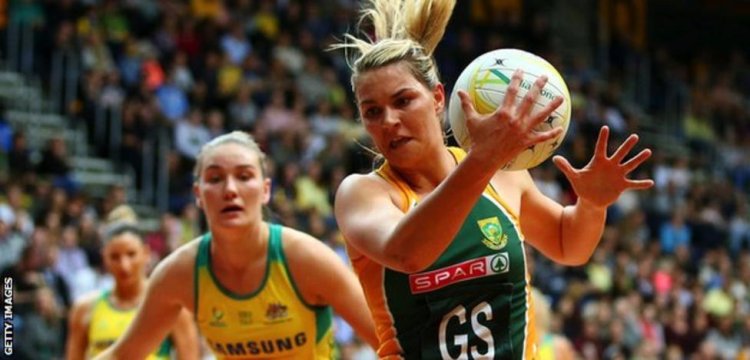South African netballer Lenize Potgieter talks about her mental health difficulties.
Potgieter was not startled when she was diagnosed with serious depression disorder.

"For two weeks, I sobbed every day and lost seven kilograms in five days."
Lenize Potgieter, a South African netball star, is back on the court after a six-month layoff due to a mental breakdown, but she wants to share her story to assist others.
She told BBC Sport Africa, "I want to raise the dialogue about mental health because it is ultimately more essential than physical health."
The 27-year-troubles old's began in May of last year when she was playing for the Adelaide Thunderbirds in Australia.
"I had a great time playing for the club and during the season," Potgieter added, "but I did get lonely."
"I was living on my own and that always messes with people's minds. When you're on your own you start overthinking and start thinking of problems, and that is what happened to me. That affected me tremendously."
The goal shooter returned home to South Africa in August once the league ended, but problems in her personal life sent her on a downward spiral.
"When I got back home, I found out that my partner of one and a half years had been seeing someone else while I was overseas," she explained.
"I think there were a lot of things piling up, starting with netball and the stress and travel, jetlag, Covid, quarantine these last couple of years, no stability at all, and then a betrayal when I went back."
"I believe that's what pushed me over the edge."
Potgieter was supposed to join the national team for a training camp in September after finishing club duty, but her symptoms became so severe that she had to seek medical care.
"I wasn't training, I was upset, I wasn't enthusiastic to go play the sport that I adore, and I was sobbing," Potgieter recounts.
"Every morning I woke up and I cried. My mom slept next to me because if she didn't, I wouldn't go to sleep - but at least if she was there, I cried myself to sleep. In five days I lost seven kilos.
"I think the big sign for me was when I cried before getting on a plane to the training camp.
"That had never happened to me before ever. I think those were the moments that I realized 'You can't cry this much - something's not right."
Potgieter was not startled when she was diagnosed with serious depression disorder.
"It was like a relief when I heard it," she remarked.
"I didn't want to think of myself as a depressed person. I just assumed to myself, 'Yes, everyone has bad days; I just have a few more,' but after she informed me I'd been diagnosed, it made sense."
Potgieter opted to take a sabbatical from her profession at this moment to focus on her recuperation. It was a significant decision for someone who began playing netball at the age of eight and has played professionally in England, New Zealand, and Australia.
"For the past seven years I have never missed a tournament for my national netball team, I have never missed a training camp for the team. Netball has always been a passion and I didn't feel that - as I had in previous years," Potgieter said.
"I thought I can't go and play netball on the stage. I'm not ready, something's happened to me that's never happened to me before, and that is missing a training camp and missing tournaments for the South African team, and it was really hard for me to do that because it is my country and I'm proud to represent them.
"There were too many external factors coming into my mind, heartache and a nervous breakdown, so I think that is the main reason I stayed away from netball - to find myself again, to find my happiness, and to find Lenize who isn't the netball player."
Support from across the globe
Potgieter's absence was noticed by South African netball fans, and after receiving numerous queries about it, she decided to share her diagnosis in a highly personal social media post.
Before she could do so, however, she had to let go of her fears.
Potgieter added, "I believed it was personal, therefore I'm not going to tell people I don't know."
"It (questions) became increasingly numerous, and I reasoned that by writing this post, I might be able to assist someone. There were likes almost immediately after it was posted on Instagram. There was nothing impolite about it."
Potgieter emphasizes the importance of her family, friends, teammates, and even individuals who reached out to her from all around the world after she went public in her recovery.
"I received encouragement from all across the world." "The individuals I play against messaged me and left comments saying, 'Thank you for opening up,'" she recalls.
"I wasn't expecting the answers, but I'm glad I went ahead and did it because even if I only helped one person, that's enough for me."
"Knowing that people care gives me such a pleasant feeling inside." They don't simply read it and conclude, "You're just sad." 'Get up, get over it,' says the narrator.
In February, Potgieter re-joined the Adelaide Thunderbirds, saying she was "happy for a second chance" to do what she loves.
Potgieter joined a group of elite athletes who have spoken up about mental health difficulties, including Japanese tennis star Naomi Osaka and America's most successful gymnast Simone Biles.
"I believe we must open out and demonstrate that we are human beings. That is something I wish to change. Someone suffering from depression does not necessarily have a communicable condition "Potgieter remarked.

 Boakyewaa Lawrencia
Boakyewaa Lawrencia 



































